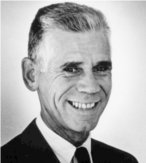Distinguished Faculty AwardJOHN LYDENBERG

JOHN LYDENBERG
Professor of English
1946-1980
Friday, September 22, 2000
John Lydenberg
Born March 22, 1913 in White Plains, New York, John Lyndenberg was the son of Madeleine Day and Harry Miller Lydenberg. His father was the director of the New York Public Library. Lyndenberg graduated from Scarsdale High School and went on to graduate from Oberlin College with a degree in English, and was elected to Phi Beta Kappa.
After completing a Masters in English at Harvard in 1938, he taught courses in American History at Bennington College before moving to Washington, D.C. during World War II to work for the War Production Board and the Department of State.
Returning to Harvard, Lydenberg completed his Ph.D. in the History of American Civilization in 1946. His interest in the connections between American literature and history were already evident in his doctorate thesis, titled, “Pre-muckraking: Attitudes Toward Politics in American Fiction, 1865 to 1910.”
John Lydenberg, his wife Marion (known as Molly), and one-year-old son, Steven, arrived in Geneva in July of 1946. Geneva and Hobart and William Smith Colleges were home to the Lydenberg family for most of the next 40 years.
He was made a full professor in 1954. At the Colleges he taught English and History courses and was instrumental in the founding of the American Studies Program. As colleague James Crenner says, the American Studies Program “was one of the, if not the first interdisciplinary program in our curriculum, and continues to be a robust and outstanding program and major for our students.” Lydenberg also played a leading role in designing the general education curriculum at the Colleges.
John took advantage of some opportunities to teach in other parts of the world. He spent time at Scripps College, Stanford University, as well as the University of Aix, and the University of Strasbourg, France, with an United States Educational Exchange grant to lecture on “American literature, intellectual history and civilization.” He published numerous articles on American writers including Harry James, Theodore Dreiser, James Gould Cozzens, William Faulkner, and John Dos Passos.
In addition to his professional life, John was involved in local politics. He was elected First Ward Councilman for the city of Geneva. Lydenberg served as a delegate to the 1968 Democratic Nation Convention in Chicago.
John’s wife, Molly, died in 1968. He later married Mary Jane Gindling, a 1967 William Smith graduate. Mary Jane’s eight children were added to the Lydenberg household.
John Lydenberg officially retired in 1980 yet continued to teach through the mid ’80’s, touching the lives of a new generation of students. He died November 10, 1987 at his home in Princeton, New Jersey. He was 74 years old.
On the wall in the corridor of the English Department in Demarest hangs a citation presented to John Lydenberg by the Alumni and Alumnae Associations on his retirement in 1980.
It reads:
“Former students have admired your teaching, your demand for excellence; they have been inspired by your published critical work, your stinging marginal comments, and your support of all that requires energy, dedication, and ingenuity. How could they be expected to know the other facets of the man who remains a gem?
Break baker, poker player, Fulbright scholar, gardener, fast walker, collector of ambiguous headlines, bird watcher, chess player, devotee of Aix-en-Provence, faculty leader, elected city councilman, delegate to a National Political Convention, puzzle solver extraordinaire, thrifty, wise, and always traveling light: you helped define the Geneva academic community from 1946 until 1980; you could have gone west to other colleges, but you chose to keep Geneva as your home base. Founder of Hobart and William Smith’s American Studies Program, you were a full member in both the Departments of History and English. You are, in all meanings, an “idea man.”
